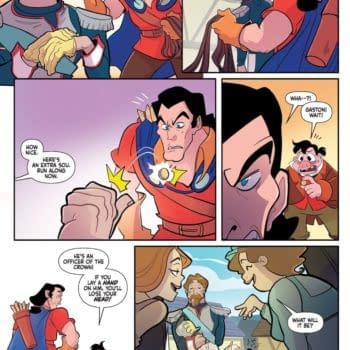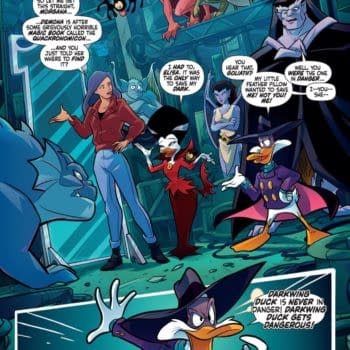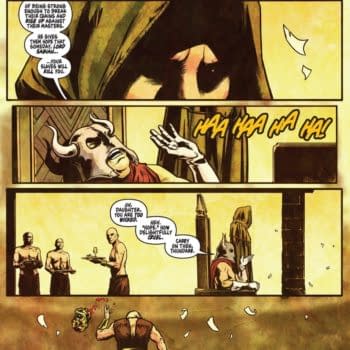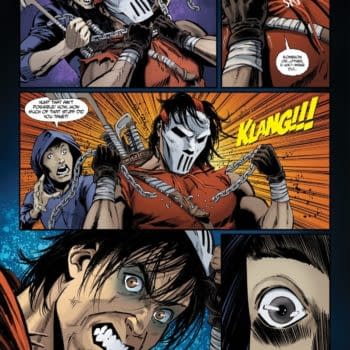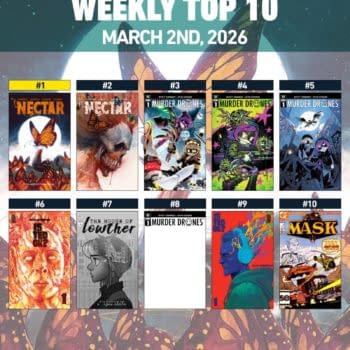Posted in: Comics | Tagged: Comics, Dynamite Entertainment, entertainment, howard chaykin, Midnight In Moscow, the shadow
Who Knows What Evil Lurks In The Heart Of Men – Howard Chaykin Knows

BLEEDING COOL: We know this isn't your first trip into the mysterious world of The Shadow, where you a fan of the character prior to working on it for DC Comics? And what was it that brought you back after so many years?
HOWARD CHAYKIN: As I've indicated a number of times in various venues, although I'm frequently presumed to be a pulp fan, I can't really say I've ever had any enthusiasms for this sort of thing as a fan. I read all the Burroughs and Howard stuff, as well as all their imitators, but the closest I could say I come to a pulp fandom is the Ian Fleming James Bond novels, which I read at the same time as Burroughs and Howard.
That said, I'm not convinced that unabashed love for material is any kind of guarantee of excellence. I think one of the reasons that original series for DC was met with whatever positive reaction it received–despite Harlan Ellison's loudly stated antipathy–was my own detachment from the source material.
I was brought back by repeated suggestions from Nick Barrucci and my attorney, who are both fans of the original material, as well as of my take on the character. Apparently, I'm easily flattered.
BC: It's been 30 years since you first worked on The Shadow: Blood & Judgment. Has your approach to the character changed in that time? How much if any has what other creators contributed to the character over those years affected your work on him?
HC: Not quite thirty, but close enough.
I can't say my approach has changed. I've always tried to avoid presentism when doing period characters–avoiding the anachronism of imposing a modern sensibility on a different time and era–failing as often as I succeed in this attempt. My instincts have always been to play Allard/Cranston/The Shadow as a man of his time–with the belief system that such a man would have, warts and all. Needless to say, this has pissed some people off. Oh well.

HC: I'm not entirely sure we want to address this issue in this interview–but if Nick is cool with it, I'll reply. My instincts here were to do a story that was a prequel/bookend to the 1986 miniseries–since I had no interest in doing a 1930s or '40s story–and if I'd opted to do a story that took place in modern times, I'd have to have completely redesigned the character, because his outfit would look absurd in today's reality.
BC: I know you have worked on many different titles over the years, but when I think of your work I tend to gravitate towards the Shadow, American Flagg!, American Century, Black Kiss… the titles with a noir/pulp feel to them. What are your feelings toward the genre and more specifically writing the dark/flawed heroes that go with it?
HC: I have to say I don't consider myself a pulpster, although my stuff does have a bleak and noirish quality. I'm always surprised by grown men and women who still want their heroes and heroines unsullied by emotions that are appropriate for grown men and women.
I've always regarded AMERICAN FLAGG!–mustn't forget the exclamation point–as a satirical take on post apocalyptic dystopias–and BLACK KISS is more darkly comic than pulp, in my estimation.
BC: The Shadow was an inspiration for the creation of Batman and maybe more obviously Moon Knight, but the character himself has never quite reached that universal appeal of the Dark Knight. Other than the Alec Baldwin feature film, why do you think the character has not reached a more mainstream audience?
HC: The Shadow was a big part of mainstream culture in the 1930s and early 1940s. I'm speaking here of the radio show, of course, from which the pulp magazine was spun.
The magazine was canceled in 1949, as interest in this sort of thing waned, with the last nail in the coffin being hammered away by television, which functionally replaced radio and magazines–both pulp and slick–as the preferred delivery system of story.
The Russell Mulcahy movie, despite its prettiness, was dreadful, like so many movies of its kind and time, unable to figure out a tone, and settling on benign good-natured contempt. It lost me the moment we saw the George Rozen nose morph into Alec Baldwin–who was a terrific choice to play Cranston. What nonsense.
BC: I it would be remiss of me not to ask what else will we be seeing hit the comic shelves with your name on it in the near future?
HC: We continue with SATELLITE SAM at IMAGE. Also at IMAGE, BLACK KISS: CHRISTMAS IN JULY, and this fall, MIDNIGHT OF THE SOUL, which I guess you might call a spiritual quest couched in the noir idiom.










